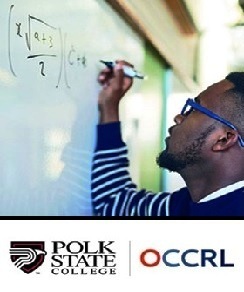National trends reflect that not only are men of color disproportionately placed into developmental reading, writing, and mathematics courses, but the success rates of this student population vary significantly from their peer groups.
Recognizing that developmental and gateway mathematics courses are a significant barrier to the success of these students, Polk State College launched the semester-long Math Equity Institute, a high-impact professional development experience for faculty members who teach developmental mathematics. The institute consisted of a half-day professional development session, completion of office hours in the college’s tutoring center, an application activity, and a closing session.
At Polk State College, part-time adjunct faculty members are the primary instructional staff who teach developmental mathematics courses. As a result, the institute was designed specifically for adjunct faculty and based on best practices for supporting Black male students. In order to establish the importance of supporting men of color in the classroom, the half-day session began with a presentation of the national, state, and institutional data on student success and completion rates. The participants then engaged in discussions and activities, led by faculty from different disciplines, on grit and growth mindset, positive messaging, and authentic care.
After a panel of mathematics faculty members shared their experiences with using intrusive advising practices in math courses, participants learned about student support services through a “speed dating” activity. This allowed faculty participants to discover available support services and meet key individuals who deliver them. Featured support services included advising, tutoring, food pantry, disability services, and mental health counseling services.
To end the half-day session, participants were given access to an online toolkit of resources and given a copy of Teaching Men of Color in the Community College: A Guidebook, written by J. Luke Wood, Frank Harris III, and Khalid White. This book contains additional information related to the strategies covered during the session.
Throughout the fall semester, participants implemented strategies from the half-day session and the supporting text into their courses and conducted office hours in the tutoring center. They were asked to hold office hours in the tutoring center so that students could increase their comfort level using the available services there. Students at Polk State College are encouraged to visit the tutoring center to seek help from their instructors and gain an introduction to the available services.
Although encouraging students to utilize office hours was a challenge, faculty participants reported that holding them in the tutoring center increased their opportunities to interact with students outside of class. Multiple participants also decided to share their personal telephone numbers with students in order to provide a high level of support and demonstrate authentic care.
The institute helped to begin an important dialogue about promoting equity of outcomes and meeting the needs of students.
Participants also incorporated new instructional techniques during the semester. They set and communicated high expectations for their students and incorporated more active and collaborative learning activities. Faculty participants reported being more proactive and avoided the “approach me first” mentality by reaching out to students who missed class or performed poorly on tests.
In addition to providing faculty with strategies for supporting Black male students, the institute helped to begin an important dialogue about promoting equity of outcomes and meeting the needs of students inside and outside of the classroom.
Megan Cavanah and Donald Painter Jr.’s institution was one of five selected for the OCCRL Educational Leaders Equity-Centered Transformation (ELECT) Spark Grants Initiative Program. Learn more.
